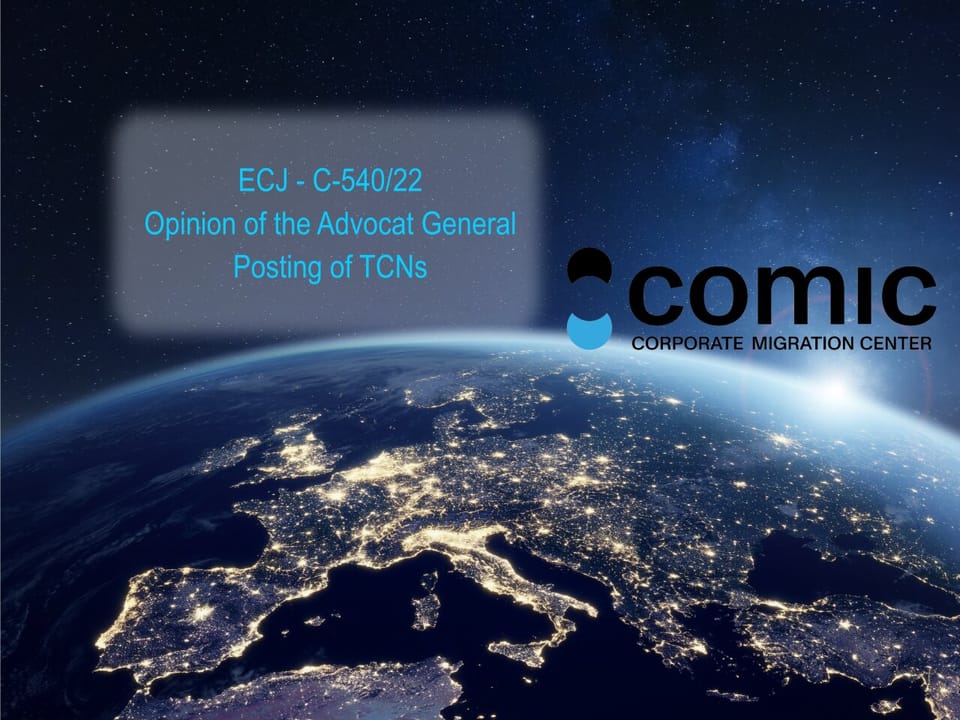Opinion of the Advocate General in C-540/22 SN and Others - Posting of Third Country Nationals

We are proud of our partners Bart Maes and David Wernsing (Maes Law) for pleading before the ECJ the case SN and Others (C-540/22).
One of the questions referred by the District Court The Hague to the Court of Justice for a preliminary ruling is whether Article 56TFEU precludes a provision of national law that the period of validity of a residence permit issued to a posted worker, may not exceed two years, irrespective of the duration of the provision of services.
The answer suggested by AG Rantos in his Opinion delivered on 30 November 2023 underlines the great deal of confusion that surrounds the interpretation of the concept of long-term posting from Article 3.1a Directive 96/71/EC as amended by Directive 2018/957/EU.
The Netherlands Government has confirmed that the maximum duration of validity of two years, is based on the fact that a posted worker remains subject to the social security rules of his or her Member State of origin over that period (see Article 12.1 Regulation 883/2004).
The EU Commission argued that such an approach is disproportionate.
The AG considers that although not an obligation, Member States may limit the validity of residence permits issued to posted workers on grounds of Article 12.1 Regulation 883/2004.
The AG suggests that “a distinction should be made between the provision of services in itself and the persons carrying it out”.
Where no provision of the Treaty affords a means of determining, in an abstract manner, the duration or frequency beyond which the supply of a service in another Member State can no longer be regarded as the provision of services within the meaning of the Treaty (Judgment of 11 December 2003, Schnitzer, C‑215/01, EU:C:2003:662, paragraphs 30 and 31), posted workers do not purport to gain access to the labour market of the host Member State (Judgment of 27 March 1990, Rush Portuguesa, C‑113/89, EU:C:1990:142, paragraph 15).
The possible limitation of the validity of residence permits on grounds of Article 12.1 Regulation 883/2004, is justified “to that effect”.
Firstly, Directive 96/71/EC and the social security coordination regulations are hermetic legal instruments (see inter alia Judgement of 14 May 2020, Bouygues travaux publics, C-17/19, EU:C:2020:379).
The fact is that where the criteria laid down by Article 4.3 Directive 2014/67/EU are met, the concept of long-term posting in the meaning of Article 3.1a Directive 96/71/EC as amended by Directive 2018/957/EU
· is laid down to compensate the link between the workers posted and the labour market of the host Member State “acknowledgment of the link between the labour market of the host Member State and the workers posted for such long periods”- see Preamble (9) Directive 2018/957/EU;
· entails the “distinction” should be made between the provision of services in itself and the persons carrying it out-see the replacement condition- Article 3.1a Directive 96/71/EC as amended;
· does not preclude situations of lawful posting in the meaning of Directive 96/71/EC as amended, and social security subjection in the host Member State (Article 11.3a Regulation 883/2004)
The ECJ ruling might bring more clarity.
The COMIC network is not only a high-level knowledge forum, but it aims to have a footprint in the positive development of the posting of workers in the framework of the provision of services.
Tanel Feldman, Immigration Law Associates – Belgium / info@euimmigrationlaw.com
Ewald Oberhammer, Oberhammer Rechtsanwälte GmbH – Austria / e.oberhammer@oberhammer.co.at

